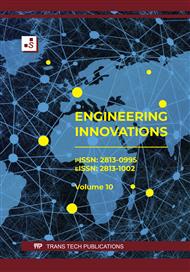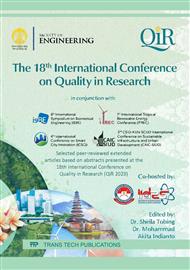[1]
I. D. Rowland, T. N. Howe, and M. J. Dewar, Vitruvius: Ten Books on Architecture. Australia: Cambridge University Press, 2014.
DOI: 10.1017/CBO9780511840951
Google Scholar
[2]
I. Lytra, C. Carrillo, R. Capilla, and U. Zdun, "Quality attributes use in architecture design decision methods: research and practice," Computing, vol. 102, no. 2, 2020.
DOI: 10.1007/s00607-019-00758-9
Google Scholar
[3]
D. Clements-Croome, "Building environment, architecture and people," Intelligent buildings: design, management …, 2004, [Online]. Available: https://books.google.com/books?hl=en&lr=&id=5EYU9jvsnvsC&oi=fnd&pg=PA53&dq=environment+architecture&ots=ZapICIzXdt&sig=e11tLCDNZnhPcJBqHRRRaVBtc34
Google Scholar
[4]
W. W. Weisser, M. Hensel, S. Barath, V. Culshaw, and ..., "Creating ecologically sound buildings by integrating ecology, architecture and computational design," People and …, 2023.
DOI: 10.1002/pan3.10411
Google Scholar
[5]
G. Dickson et al., "Walking on Visual Illusions," Iperception, vol. 12, no. 1, 2021.
DOI: 10.1177/2041669520981101
Google Scholar
[6]
E. P. Mumford, Habitat: ecology thinking in architecture: Dirk van den Heuvel, Janno Martens, Victor Muñoz Sanz (eds) nai010 publishers, 2020 ISBN 9789462085565 hardback£ …. Taylor &Francis, 2021.
DOI: 10.1080/13602365.2021.1984025
Google Scholar
[7]
G. Giordano and P. Gunther, Illusion In Design : New Trends In Architecture and Interiors. New York: Rizzoli, 2022.
Google Scholar
[8]
NHBC Foundation, Homes through the decades: The making of modern housing. 2015. [Online]. Available: www.rcahms.gov.uk:
Google Scholar
[9]
D. E. Williams, Sustainable design: ecology, architecture, and planning. books.google.com, 2007. [Online]. Available: https://books.google.com/books?hl=en&lr=&id=1l3fO6Wqh_gC&oi=fnd&pg=PR9&dq=ecology+architecture&ots=jIagRDaM5U&sig=uCHl7X8VMNAOWYyaFvaNCPioSV4
Google Scholar
[10]
P. Kumari, S. Kapur, V. Garg, and K. Kumar, "Effect of surface temperature on energy consumption in a calibrated building: A case study of Delhi," Climate, vol. 8, no. 6, 2020.
DOI: 10.3390/CLI8060071
Google Scholar
[11]
J. Gaffney et al., "Maximizing value of genetic sequence data requires an enabling environment and urgency," Glob Food Sec, vol. 33, 2022.
DOI: 10.1016/j.gfs.2022.100619
Google Scholar
[12]
E. Kinkaid, The architecture of ecology: Systems design for sustainable agricultural landscapes. rave.ohiolink.edu, 2013. [Online]. Available: https://rave.ohiolink.edu/etdc/view?acc_num=ouhonors1366983104
Google Scholar
[13]
B. Vale and R. J. D. Vale, "Green architecture : design for a sustainable future / Brenda and Robert Vale.," 1996, Accessed: Sep. 09, 2023. [Online]. Available: https://books.google.com/books/about/Green_Architecture.html?hl=id&id=PpdlQgAACAAJ
Google Scholar
[14]
M. Acuto and W. Steele, Global city challenges: Debating a Concept, Improving the Practice. London: Palgrave Macmillan, 2013.
Google Scholar
[15]
A. Picon, The Materiality of Architecture. Minneapolis: University of Minnesota Press, 2021.
DOI: 10.5749/J.CTV1DWQ1VQ
Google Scholar
[16]
M. Noghabaei, A. Heydarian, V. Balali, and K. Han, "Trend analysis on adoption of virtual and augmented reality in the architecture, engineering, and construction industry," Data (Basel), 2020, [Online]. Available: https://www.mdpi.com/663900
DOI: 10.20944/preprints201912.0369.v1
Google Scholar
[17]
R. Arnheim, Art and the Visual Perception: A Psychology of the Creative Eye. California: University of California Press, 1974. Accessed: May 29, 2023. [Online]. Available: https://books.google.com/books/about/Art_and_Visual_Perception.html?hl=id&id=Z7LQRiSM1I4C
Google Scholar
[18]
"Circle of Senses, Circle of Stars (Steiners 12 Senses) - YouTube." Accessed: Sep. 08, 2023. [Online]. Available: https://www.youtube.com/watch?v=GNgBf4OpTrE
Google Scholar
[19]
R. V. Andersen, J. Toftum, K. K. Andersen, and B. W. Olesen, "Survey of occupant behaviour and control of indoor environment in Danish dwellings," Energy Build, vol. 41, no. 1, 2009.
DOI: 10.1016/j.enbuild.2008.07.004
Google Scholar
[20]
N. Ishikawa and M. Fukushige, "Effects of street landscape planting and urban public parks on dwelling environment evaluation in Japan," Urban For Urban Green, vol. 11, no. 4, 2012.
DOI: 10.1016/j.ufug.2012.08.001
Google Scholar
[21]
D. Kalibatas, E. K. Zavadskas, and D. Kalibatiene, "The concept of the ideal indoor environment in multi-attribute assessment of dwelling-houses," Archives of Civil and Mechanical Engineering, vol. 11, no. 1, 2011.
DOI: 10.1016/S1644-9665(12)60176-9
Google Scholar
[22]
A. A. Gamaldo, J. M. McNeely, M. T. Shah, M. K. Evans, and A. B. Zonderman, "Racial differences in self-reports of short sleep duration in an urban-dwelling environment," Journals of Gerontology - Series B Psychological Sciences and Social Sciences, vol. 70, no. 4, 2015.
DOI: 10.1093/geronb/gbt117
Google Scholar
[23]
N. Ishikawa and M. Fukushige, "Dissatisfaction with dwelling environments in an aging society: An empirical analysis of the Kanto Area in Japan," Review of Urban and Regional Development Studies, vol. 27, no. 3, 2015.
DOI: 10.1111/rurd.12038
Google Scholar
[24]
M. Bian, Z. Huang, Q. Chen, G. Liu, Y. Zhang, and S. Ding, "Optimization of Plane and Space of New Dwellings in Southern Anhui Province Based on Indoor Thermal Environment," Sustainability (Switzerland), vol. 14, no. 9, 2022.
DOI: 10.3390/su14095694
Google Scholar
[25]
I. Hidayat and W. Zahrah, "Medan The Vertical Village Design In Kelurahan Aur (With Ecology Architecture Design Approach)," International Journal of Architecture and …, 2017, [Online]. Available: https://talenta.usu.ac.id/ijau/article/view/257
DOI: 10.32734/ijau.v1i1.257
Google Scholar
[26]
T. Mao and Q. Li, "Research on the relationship between the formation of local construction culture and geographical environment based on adaptability analysis," J King Saud Univ Sci, vol. 35, no. 1, 2023.
DOI: 10.1016/j.jksus.2022.102387
Google Scholar
[27]
E. Palazzo and S. Wang, "Landscape Design for Flood Adaptation from 20 Years of Constructed Ecologies in China," Sustainability (Switzerland), vol. 14, no. 8, 2022.
DOI: 10.3390/su14084511
Google Scholar
[28]
K. H. Rahayu, R. Nugroho, and A. Hardiana, "AGROWISATA KOPI DI KLEDUNG KABUPATEN TEMANGGUNG DENGAN PENDEKATAN ARSITEKTUR EKOLOGI," Arsitektura, vol. 14, no. 2, 2017.
DOI: 10.20961/arst.v14i2.9042
Google Scholar
[29]
B. Salgın, Ö. Bayram, A. Akgün, and K. Agyekum, "Sustainable Features of Vernacular Architecture: Housing of Eastern Black Sea Region as a Case Study," Arts, vol. 6, no. 4, 2017.
DOI: 10.3390/arts6030011
Google Scholar
[30]
W. Zahrah and M. H. S. Putra, "Design of Vertical Village in Pantai Burung Village Medan City (Ecology Architecture)," International Journal of Architecture and Urbanism, vol. 2, no. 1, 2018.
DOI: 10.32734/ijau.v2i1.291
Google Scholar
[31]
S. A. Rahman, E. P. Singgih, and W. Setyaningsih, "TAMAN PINTAR DENGAN PENDEKATAN ARSITEKTUR EKOLOGI DI MATARAM," Arsitektura, vol. 14, no. 2, 2017.
DOI: 10.20961/arst.v14i2.9080
Google Scholar
[32]
S. Surya, "Landscape Ecological Urbanism for Restoration of Pallikaranai Marsh Land, Chennai, Tamil Nadu," Procedia Technology, vol. 24, 2016.
DOI: 10.1016/j.protcy.2016.05.227
Google Scholar
[33]
S. Jasper, "Acoustic Ecologies: Architecture, Nature, and Modernist Experimentation in West Berlin," Ann Am Assoc Geogr, vol. 110, no. 4, 2020.
DOI: 10.1080/24694452.2019.1673143
Google Scholar
[34]
P. Kanuch and P. Taus, "Efficiency Possibilities of Energy Management of Apartment Building – Use Case," Advances in Thermal Processes and Energy Transformation, vol. 5, no. 4, p.60–68, 2022.
DOI: 10.54570/ATPET2022/05/04/0060
Google Scholar
[35]
E. Shagiakhmetova, D. Burkeev, S. Fedorova, and D. Shaikhutdinova, "Improving energy efficiency of rental housing," in E3S Web of Conferences, EDP Sciences, Jun. 2021.
DOI: 10.1051/e3sconf/202127405001
Google Scholar
[36]
A. Sabrina Ismail and N. S. Sa'ezan, "The Application of Rainwater as Architectural Design Elements For Green Technology Solution In Low Rise Office Building," International Journal of Built Environment and Sustainability, vol. 5, no. 3, Sep. 2018.
DOI: 10.11113/ijbes.v5.n3.300
Google Scholar
[37]
M. B. Nielsen and S. Knardahl, "The impact of office design on medically certified sickness absence," Scand J Work Environ Health, vol. 46, no. 3, p.330–334, 2020.
DOI: 10.5271/sjweh.3859
Google Scholar
[38]
S. W. Lindsay, M. Jawara, K. Paine, M. Pinder, G. E. L. Walraven, and P. M. Emerson, "Changes in house design reduce exposure to malaria mosquitoes," Tropical Medicine and International Health, vol. 8, no. 6, p.512–517, Jun. 2003.
DOI: 10.1046/j.1365-3156.2003.01059.x
Google Scholar
[39]
D. Dan et al., "Passive house design-An efficient solution for residential buildings in Romania," Energy for Sustainable Development, vol. 32, p.99–109, Jun. 2016.
DOI: 10.1016/j.esd.2016.03.007
Google Scholar
[40]
N. Sani, "Modern houses design for Malaysian," Advances in Applied Science Research, vol. 3, no. 6, p.3810–3813, 2012.
Google Scholar
[41]
S. M. Ifani, "Local Wisdom in Coffee House Design to Promote Gayo Culture and Tourism," International Journal of Architecture and Urbanism, vol. 3, no. 1, p.32–42, Mar. 2019.
DOI: 10.32734/ijau.v3i1.790
Google Scholar
[42]
A. Al-Anzi and O. Khattab, "Solar conscious house design in Kuwait," Kuwait Journal of Science and Engineering, vol. 37, no. 2 B, p.59–72, Dec. 2010.
Google Scholar
[43]
A. Almusaed, A. Almssad, and A. Alasadi, "Analytical interpretation of energy efficiency concepts in the housing design process from hot climate," Journal of Building Engineering, vol. 21, p.254–266, Jan. 2019.
DOI: 10.1016/j.jobe.2018.10.026
Google Scholar
[44]
L. Wang, J. Gwilliam, and P. Jones, "Case study of zero energy house design in UK," Energy Build, vol. 41, no. 11, p.1215–1222, Nov. 2009.
DOI: 10.1016/j.enbuild.2009.07.001
Google Scholar
[45]
E. Meutia and L. H. Sari, "ADAPTIVE HOUSE DESIGN AND PEOPLE'S HABITS IN ACHIEVING THERMAL COMFORT IN GAYO HIGHLAND ACEH, INDONESIA," Malaysian Journal of Sustainable Environment, vol. 8, no. 1, p.23, Mar. 2021.
DOI: 10.24191/myse.v8i1.12656
Google Scholar
[46]
F. Rizal and A. Demami, "Rumah Tinggal Pasca Pandemi Covid-19 ( A Review on House Design Covid-19 Post Pandemic )," Jurnal IPTEK, vol. 6, no. 1, p.22–33, 2022.
DOI: 10.31543/jii.v6i1.193
Google Scholar
[47]
R. Ghaziani, M. Lemon, and P. Atmodiwirjo, "Biophilic design patterns for primary schools," Sustainability (Switzerland), vol. 13, no. 21, Nov. 2021.
DOI: 10.3390/su132112207
Google Scholar
[48]
M. G. Ariani and F. Mirdad, "The Effect of School Design on Student Performance," International Education Studies, vol. 9, no. 1, p.175, Dec. 2015.
DOI: 10.5539/ies.v9n1p175
Google Scholar
[49]
T. Peters and K. D'Penna, "Biophilic design for restorative university learning environments: A critical review of literature and design recommendations," Sustainability (Switzerland), vol. 12, no. 17, Sep. 2020.
DOI: 10.3390/su12177064
Google Scholar
[50]
C. Candido, P. Chakraborty, and D. Tjondronegoro, "The rise of office design in high-performance, open-plan environments," Buildings, vol. 9, no. 4, Apr. 2019.
DOI: 10.3390/buildings9040100
Google Scholar
[51]
N. Wang and H. Adeli, "Sustainable building design," Journal of Civil Engineering and Management, vol. 20, no. 1. Taylor and Francis, p.1–10, 2014.
DOI: 10.3846/13923730.2013.871330
Google Scholar
[52]
D. Bangwal, J. Suyal, and R. Kumar, "Hotel building design, occupants' health and performance in response to COVID 19," Int J Hosp Manag, vol. 103, May 2022.
DOI: 10.1016/j.ijhm.2022.103212
Google Scholar
[53]
R. Bulbaai and J. I. M. Halman, "Energy-efficient building design for a tropical climate: A field study on the caribbean island curaçao," Sustainability (Switzerland), vol. 13, no. 23, Dec. 2021.
DOI: 10.3390/su132313274
Google Scholar
[54]
S. P. Dash, "Application of biomimicry in building design," International Journal of Civil Engineering and Technology, vol. 9, no. 2, p.644–660, Feb. 2018.
Google Scholar
[55]
F. T. B. Samodra, Irvansyah, and C. Erwindi, "Standard review and update for tropical comfort shift of the built environment," in E3S Web of Conferences, E. Kusrini, F. H. Juwono, A. Yatim, and E. A. Setiawan, Eds., Nov. 2018, p.04013.
DOI: 10.1051/e3sconf/20186704013
Google Scholar
[56]
F. X. T. B. Samodra and I. Irvansyah, "Livable of the past-rural affordable settlement in current urban environment," IOP Conf Ser Earth Environ Sci, vol. 780, no. 1, p.012001, May 2021.
DOI: 10.1088/1755-1315/780/1/012001
Google Scholar
[57]
A. Hussain and M. A. Kamal, "Energy Efficient Sustainable Building Materials: An Overview," Key Eng Mater, vol. 650, p.38–50, 2015.
DOI: 10.4028/www.scientific.net/KEM.650.38
Google Scholar
[58]
E. V Pimenova, M. N. Grigoryan, and P. V Ivanova, "The Use of Spatial Voids in the Formation of High-Rise Buildings Architecture," Materials Science Forum, vol. 931, p.443–450, 2018.
DOI: 10.4028/www.scientific.net/MSF.931.443
Google Scholar



